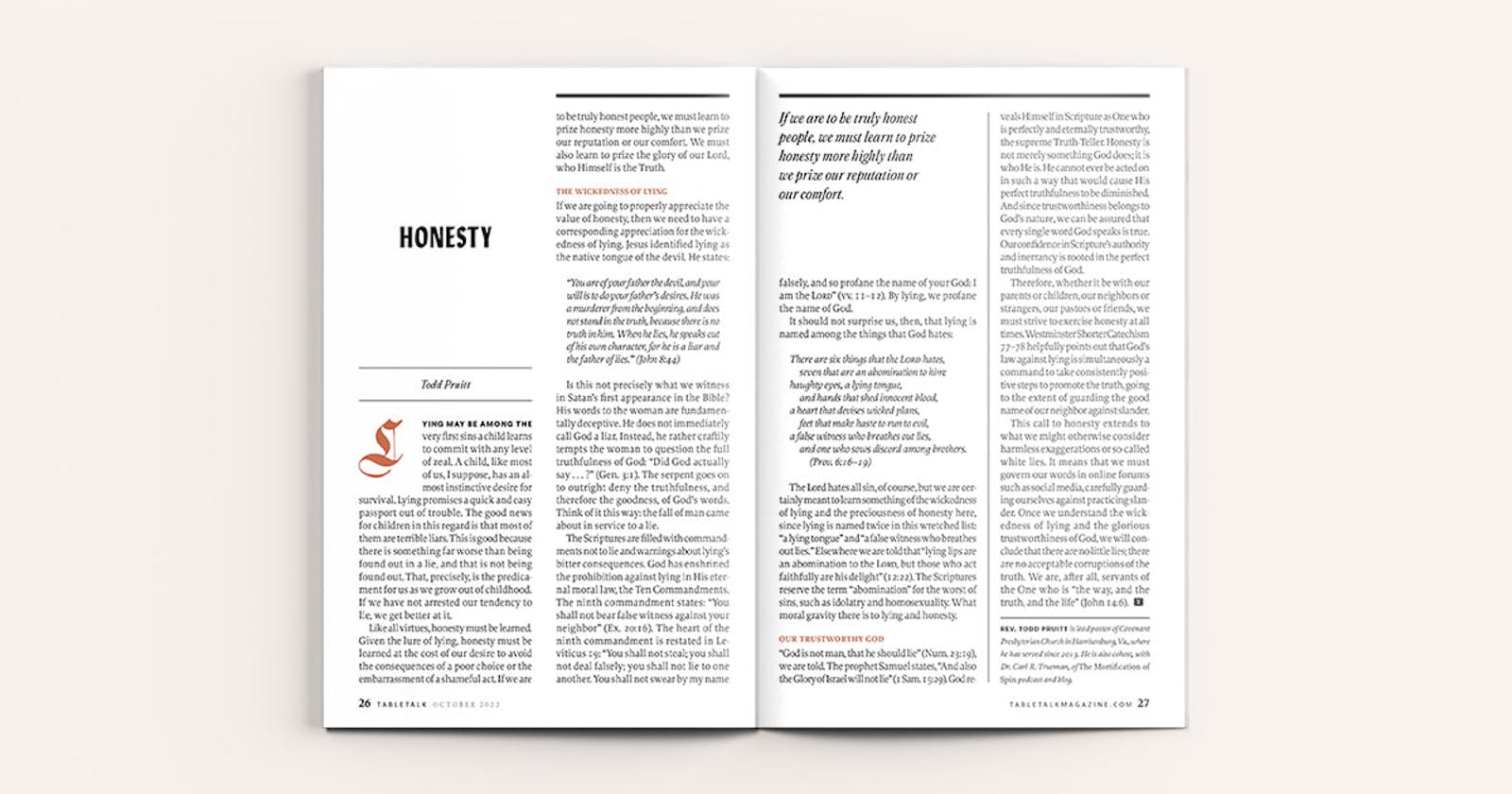
Request your free, three-month trial to Tabletalk magazine. You’ll receive the print issue monthly and gain immediate digital access to decades of archives. This trial is risk-free. No credit card required.
Try Tabletalk NowAlready receive Tabletalk magazine every month?
Verify your email address to gain unlimited access.
Lying may be among the very first sins a child learns to commit with any level of zeal. A child, like most of us, I suppose, has an almost instinctive desire for survival. Lying promises a quick and easy passport out of trouble. The good news for children in this regard is that most of them are terrible liars. This is good because there is something far worse than being found out in a lie, and that is not being found out. That, precisely, is the predicament for us as we grow out of childhood. If we have not arrested our tendency to lie, we get better at it.
Like all virtues, honesty must be learned. Given the lure of lying, honesty must be learned at the cost of our desire to avoid the consequences of a poor choice or the embarrassment of a shameful act. If we are to be truly honest people, we must learn to prize honesty more highly than we prize our reputation or our comfort. We must also learn to prize the glory of our Lord, who Himself is the Truth.
the wickedness of lying
If we are going to properly appreciate the value of honesty, then we need to have a corresponding appreciation for the wickedness of lying. Jesus identified lying as the native tongue of the devil. He states:
“You are of your father the devil, and your will is to do your father’s desires. He was a murderer from the beginning, and does not stand in the truth, because there is no truth in him. When he lies, he speaks out of his own character, for he is a liar and the father of lies.” (John 8:44)
Is this not precisely what we witness in Satan’s first appearance in the Bible? His words to the woman are fundamentally deceptive. He does not immediately call God a liar. Instead, he rather craftily tempts the woman to question the full truthfulness of God: “Did God actually say . . . ?” (Gen. 3:1). The serpent goes on to outright deny the truthfulness, and therefore the goodness, of God’s words. Think of it this way: the fall of man came about in service to a lie.
The Scriptures are filled with commandments not to lie and warnings about lying’s bitter consequences. God has enshrined the prohibition against lying in His eternal moral law, the Ten Commandments. The ninth commandment states: “You shall not bear false witness against your neighbor” (Ex. 20:16). The heart of the ninth commandment is restated in Leviticus 19: “You shall not steal; you shall not deal falsely; you shall not lie to one another. You shall not swear by my name falsely, and so profane the name of your God: I am the LORD” (vv. 11–12). By lying, we profane the name of God.
It should not surprise us, then, that lying is named among the things that God hates:
There are six things that the LORDhates,
seven that are an abomination to him:
haughty eyes, a lying tongue,
and hands that shed innocent blood,
a heart that devises wicked plans,
feet that make haste to run to evil,
a false witness who breathes out lies,
and one who sows discord among brothers. (Prov. 6:16–19)
The Lord hates all sin, of course, but we are certainly meant to learn something of the wickedness of lying and the preciousness of honesty here, since lying is named twice in this wretched list: “a lying tongue” and “a false witness who breathes out lies.” Elsewhere we are told that “lying lips are an abomination to the LORD, but those who act faithfully are his delight” (Prov. 12:22). The Scriptures reserve the term “abomination” for the worst of sins, such as idolatry and homosexuality. What moral gravity there is to lying and honesty.
our trustworthy god
“God is not man, that he should lie” (Num. 23:19), we are told. The prophet Samuel states, “And also the Glory of Israel will not lie” (1 Sam. 15:29). God reveals Himself in Scripture as One who is perfectly and eternally trustworthy, the supreme Truth-Teller. Honesty is not merely something God does; it is who He is. He cannot ever be acted on in such a way that would cause His perfect truthfulness to be diminished. And since trustworthiness belongs to God’s nature, we can be assured that every single word God speaks is true. Our confidence in Scripture’s authority and inerrancy is rooted in the perfect truthfulness of God.

Therefore, whether it be with our parents or children, our neighbors or strangers, our pastors or friends, we must strive to exercise honesty at all times. Westminster Shorter Catechism 77–78 helpfully points out that God’s law against lying is simultaneously a command to take consistently positive steps to promote the truth, going to the extent of guarding the good name of our neighbor against slander.
This call to honesty extends to what we might otherwise consider harmless exaggerations or so-called white lies. It means that we must govern our words in online forums such as social media, carefully guarding ourselves against practicing slander. Once we understand the wickedness of lying and the glorious trustworthiness of God, we will conclude that there are no little lies; there are no acceptable corruptions of the truth. We are, after all, servants of the One who is “the way, and the truth, and the life” (John 14:6).
